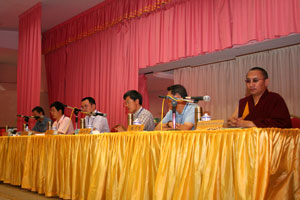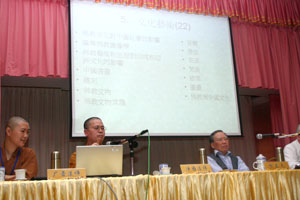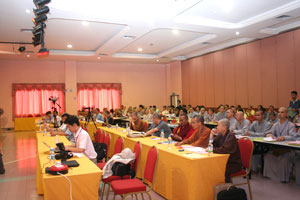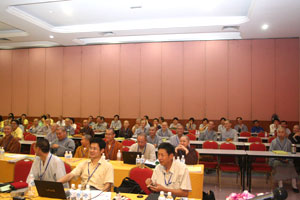Submitted by zhenliang on
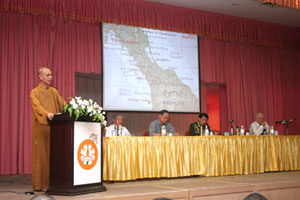
The 2nd International Buddhist College (IBC) Buddhist Academic Conference was officially declared open on 10 August 2007 by Venerable Wei Wu at the Opening and Welcoming Banquet held at the Multi Purpose Hall of Than Hsiang Temple. The Conference was spread over three days till 12 August 2007 . This year's Conference saw the participation of 28 Buddhist Studies scholars from China , Hong Kong , Taiwan , Singapore and IBC itself. The theme for this year's Conference was “Researches in Chinese Buddhism” and the scholars presented papers from their respective fields of expertise.
In his opening speech, Venerable Wei Wu, the Abbot of Than Hsiang Temple and Council Chairman of IBC, thanked all presenters and participants for their kind support and participation. He explained that one of the main objectives of conducting the Chinese Buddhism Conference in the Chinese medium was to enhance the understanding of Buddhism of Chinese tradition among the Chinese speaking Buddhist community through the papers presented and dialogue between presenters and participants. The event provided an opportunity for participants to keep abreast of the latest academic and social development of Buddhism in this part of the world.
Venerable Wei Wu also traced the history of Buddhism in the Malay Peninsula to the founding of the Kingdom of Langkasuka in the 1st century AD. Chronicles of the Buddhist traveler I-Ching and the Liang dynasty record attested to the existence of such a Hindu Malay state that once adopted Buddhism. Incidentally, the present location of the IBC also falls within the boundary of this ancient kingdom of Langkasuka .
Venerable Wei Wu briefly reminisced on the formation of IBC since its inception in the year 2001. Presently, the College runs a four year BA course and a one year MA course in Buddhist Studies and the latter is conducted in both English and Chinese medium. With the recent approval of the Education Ministry of Thailand, IBC will in the near future start its PhD Programme in Buddhist Studies.
Professor C F Lee, JP of Tung Lin Kok Yuen and Pro-Vice-Chancellor of the University of Hong Kong was next to speak as the co-sponsor of the Conference. Professor Lee expressed his appreciation for the invitation and complimented the noble objective of IBC. He commented the recognition of Buddha's wisdom and his teachings is evidenced by the setting up of Buddhist studies courses in many international prestigious universities such as Harvard and Oxford . He stressed the importance of training sangha members and serious lay Buddhists as effective Dharma teachers of the timeless and universal teaching of the Buddha.
Professor Charles Willerman, IBC‘s Vice Rector for Research and Post-graduate Studies of IBC, in his speech said that he felt honored to be the organizer of the Conference and was pleased to see the gathering of so many Chinese Buddhist scholars.
Professor Hwang Xin Chuan thanked the Oganising Committee of the Conference on behalf of all the presenters invited for the Conference. He praised Than Hsiang Temple for the establishment of yet another international Buddhist college in the spirit of the renowned Nalanda University .
Y. B. Datuk Teng Hock Nam , who stood in for the Chief Minister of Penang congratulated IBC for the effort in successfully organising the first Chinese Buddhist academic conference of such magnitude. He further added that he concurred fully with the remarks of Professor C. F. Lee in the training of competent Dharma propagators.
All the guests were then invited to a buffer dinner at the back portion of the hall. While they ate, they were entertained by a varied programme of songs, dance and sketch performed by the Than Hsiang Kindergarten, Youth Group and the senior residents of Wan Ching Yuen Centre on stage.
The Conference attracted more than ninety participants and there were seven panels spread over the three days, with three or four speakers in each panel. Professor Charles Willemen said the Conference turned out to be much better than he expected and all the invited speakers, some of whom were the top in their fields in China , without exception voiced warm approval of the Conference and were happy with its organisation.
